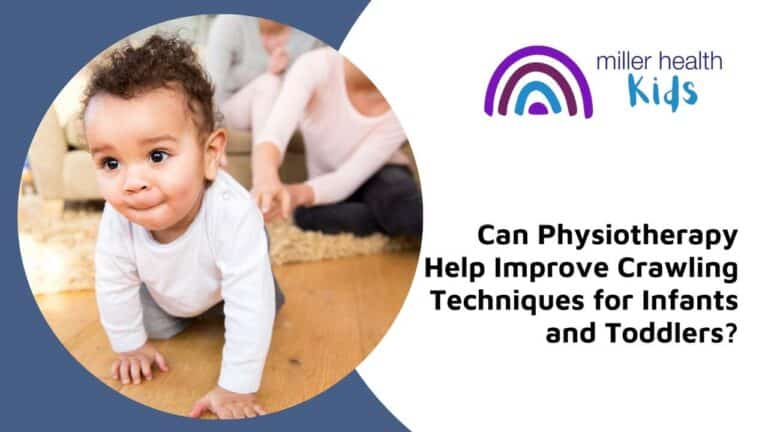
Are you giving birth to a Down Syndrome baby or have a child with Down Syndrome? It can feel scary, but we’re here to let you know that you are not alone. Dive into developmental milestone expectations and discover the importance of Paediatric Physiotherapy for your child.
Reasons for Developmental Delays
The first years of life are an important time in a child’s development. Children with Down Syndrome will often reach their milestones such as sitting, crawling and walking, later than other kids, so early intervention beginning shortly after birth is highly recommended. Children with Down Syndrome develop their skills at their own pace, which is ok!
It is important not to compare your child against typically developing siblings or other children with the condition. Children with Down Syndrome will likely experience delays in achieving certain milestones due to the following reasons:
Physiotherapy in the First Few Months of Life
As physiotherapists, we are not trying to speed up when your baby achieves their milestones, rather we are aiming to improve the quality of their movements and help prevent the development of different movement patterns. Physiotherapists’ main focus is on gross motor development and helping children achieve milestones such as rolling, sitting, crawling and walking.
Below is a summary of milestones for children with Down Syndrome to use as a guide:
| Milestone | Range for Children with Down Syndrome | Typical Range |
| Gross Motor | ||
| Sits Alone | 6-36 months | 5-9 months |
| Crawls | 8-22 Months | 6-12 months |
| Stands | 1-3.25 years | 8-17 months |
| Walks alone | 1-4 years | 9-18 months |
| Language | ||
| First word | 1-4 years | 1-2 years |
| Two-word phrases | 2-7.5 years | 15-32 months |
| Social/Self Help | ||
| Smiles | 1-5 months | 1-3 months |
| Finger feeds | 10-24 months | 7-15 months |
| Drinks from cup (unassisted) | 12-32 months | 9-18 months |
| Uses spoon | 13-39 months | 12-20 months |
| Toilet trained | 2-7 years | 16-42 months |
| Dresses self (unassisted) | 3.5-8.5 years | 3.25-5 years |
Figure 1: Guide to milestone achievement for children with Down Syndrome (National Down Syndrome Society, 2023)
Diaper Change Exercises
Spend no more than 5 minutes with the below exercises to avoid overwhelming your baby.
- Talk to your baby and encourage them to look at you to increase eye contact
- Bend up their hips and cycle the legs like riding a bicycle (4-6 times)
- Put their knees together and slowly rock them from side to side (4-6 times) to prevent tightness in their leg muscles
- Firmly stroke your babies’ upper legs to their tummy to encourage them to kick their legs up (4-6 times)
- Bring your baby’s hands to their mouth and rub their hands together so they become aware of where their hands and mouth are (30 seconds)
When replacing their diaper, make sure it is not too tight and that your baby’s hips and knees can easily bend.
Things You Can Do To Help Your Baby’s Development
Picking Up in Side-Lying
Turn your baby onto their side with arms in front and pick up and put down your baby through a side-lying position to help with head control and development of their neck muscles. Make sure you alternate sides that you pick up and put your baby down through.
Swaddling
When swaddling your baby make sure to have their arms forward and hands towards their mouth to promote opportunities for hand-to-mouth play. Positions of “tucking” will also help your baby with rolling, sitting and crawling as they get older.
Tummy Time
Tummy time will help strengthen your baby’s back and neck muscles so aim to have 30 minutes a day at 4 months but make sure you are ALWAYS supervising them in this position, in accordance with Sudden Infant Death Syndrome (SIDS) guidelines. While your baby is in tummy time you can help position their arms forward and prop them on their elbows if they are having difficulty with this around 3 months of age.
Final Words
Booking an appointment is the first step in early intervention for your baby. Together, you and the physiotherapist will develop a plan to optimize the quality of your child’s movement and gross motor development. Book your appointment now.
Miller Health offers a wide variety of services with individualized treatment plans to help with neurological conditions, developmental delay and many other common conditions.
References:
National Down Syndrome Society (2020). Early Intervention. Retrieved from: https://www.ndss.org/resources/early-intervention/
Pregnancy Birth and Baby (2023). Caring for a Child with Down Syndrome. Retrieved from: https://www.pregnancybirthbaby.org.au/caring-for-a-child-with-down-syndrome








